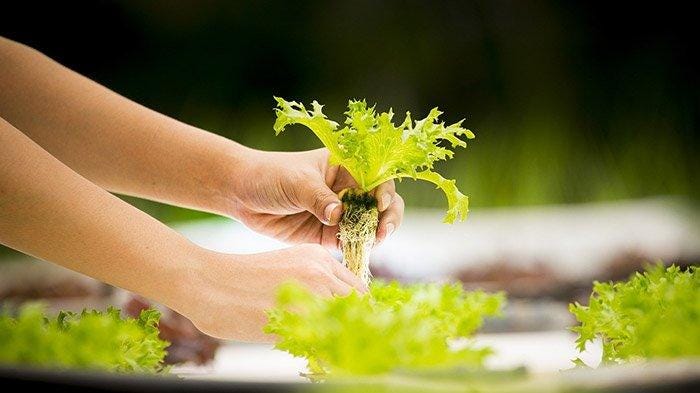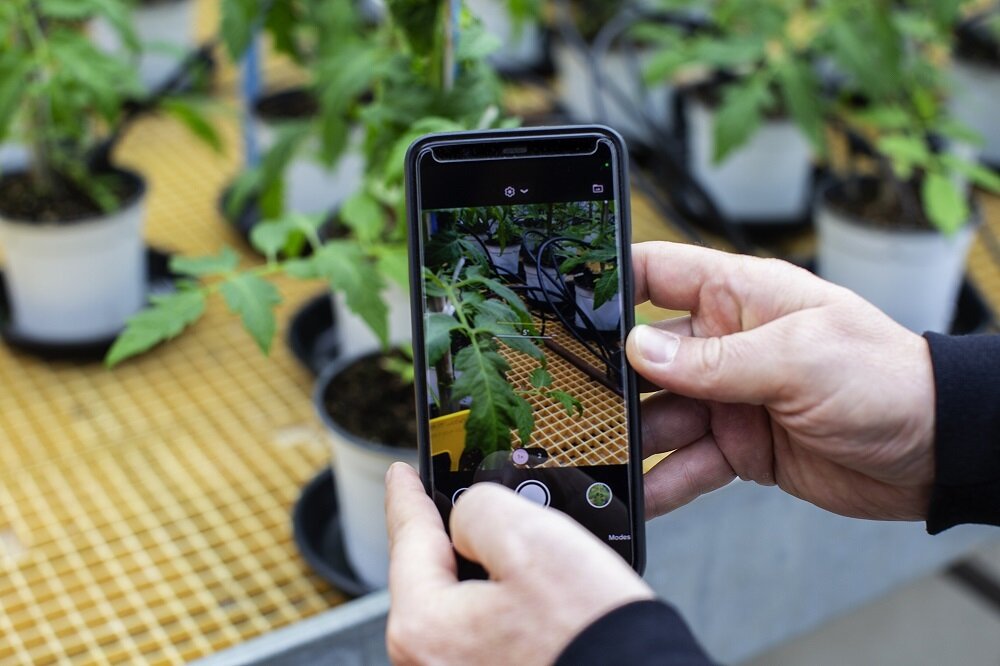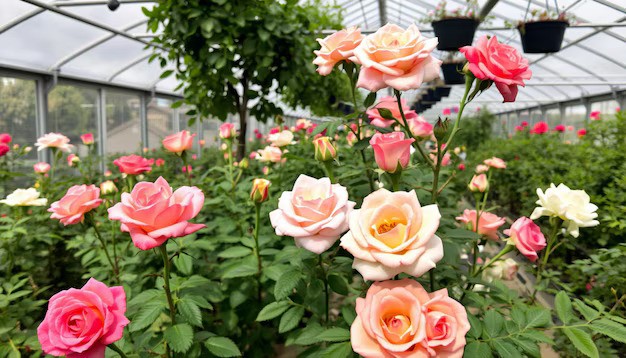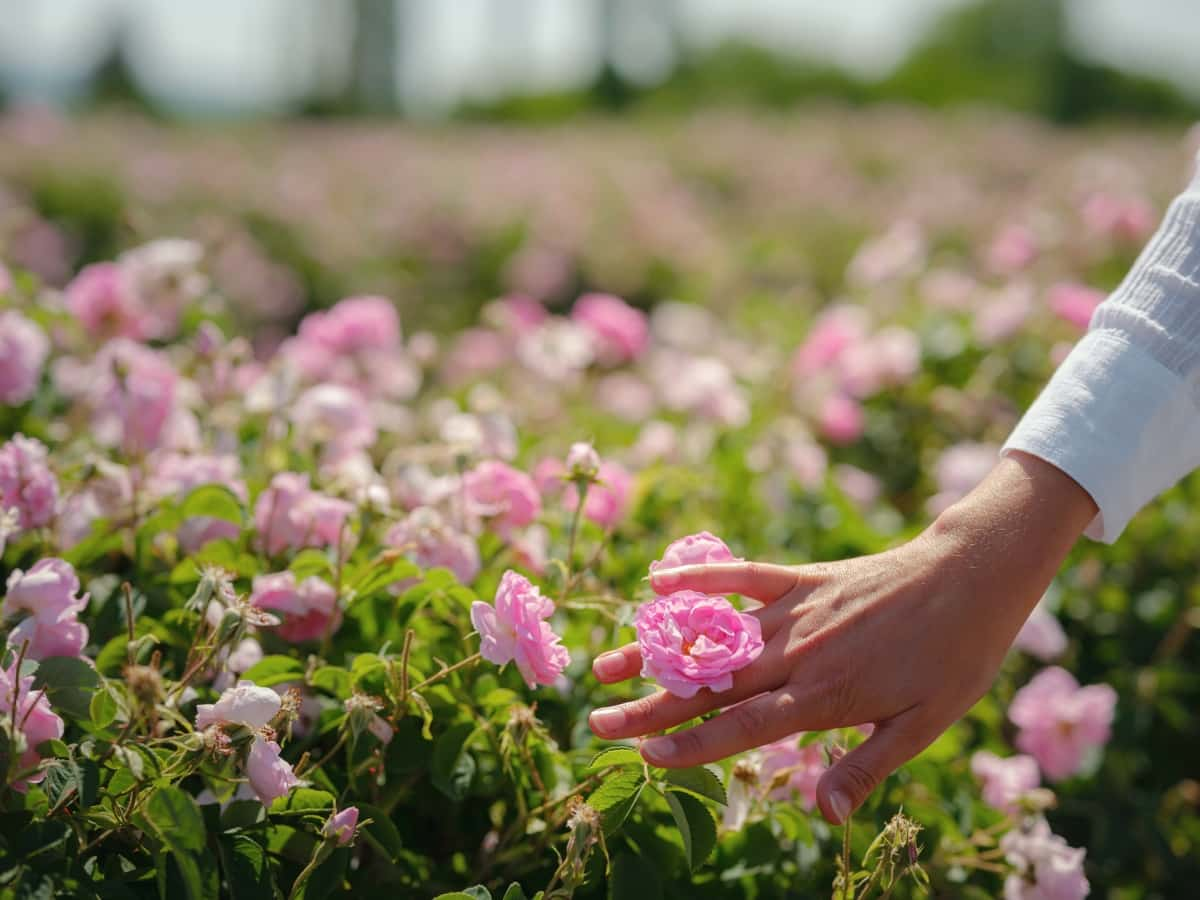Creating A Sustainable Rose Garden - Using AI For Eco-Friendly Practices
Grow roses sustainably with AI-powered solutions. Learn how smart irrigation, pest detection, and eco-friendly practices can create a thriving, greener garden.
Mar 18, 20256K Shares105.8K Views

Roses have long been symbols of beauty and elegance, but growing them sustainably can be a challenge. With the help of artificial intelligence (AI), eco-friendly rose gardening is now more accessible than ever.
This guide showcases how innovative technologies and sustainable practices can help you cultivate a thriving rose garden while minimizing your environmental impact.
The Need For Sustainable Rose Gardening
Roses are beloved for their beauty and fragrance, but traditional growing methods can have unintended environmental consequences. Many gardeners unknowingly contribute to excessive water usage, soil degradation, and chemical pollution, all of which impact biodiversity and long-term garden health. Below are some major concerns that highlight the need for sustainable rose gardening practices.
1. Excessive Water Use - A Strain On Resources
Roses require consistent watering, especially in warm climates. However, excessive irrigation can:
- Deplete Local Water Sources:Traditional overhead watering methods often lead to wasteful runoff, especially in regions experiencing drought or water scarcity.
- Encourage Shallow Root Growth:Frequent surface watering discourages deep root development, making plants more vulnerable to drought stress.
- Increase the Risk of Fungal Diseases:Overly damp conditions create the perfect environment for fungal infections such as black spot and powdery mildew.
Sustainable solutions, such as AI-powered irrigation systems, help conserve water by analyzing soil moisture levels and weather patterns to deliver only the necessary amount of water directly to the roots.
2. Soil Depletion - The Risk Of Over-Fertilization And Monoculture
Healthy soil is essential for strong, disease-resistant roses. However, common gardening practices can lead to soil degradation over time:
- Overuse of Synthetic Fertilizers:Many gardeners rely on chemical fertilizers to encourage blooming, but repeated use can strip soil of its natural nutrients, disrupting the balance of beneficial microbes.
- Lack of Crop Rotation:Roses are often grown in the same location for years, leading to monoculture issues where nutrients become depleted and soil-borne diseases build up.
- Compacted and Eroded Soil:Heavy foot traffic, tilling, and exposure to wind or rain can lead to compacted soil, reducing oxygen flow to roots and making it harder for roses to absorb nutrients.
AI-driven soil sensors can help gardeners monitor nutrient levels in real-time, allowing for more precise fertilization strategies that replenish the soil naturally rather than depleting it.
3. Chemical Dependency - The Impact Of Pesticides And Synthetic Fertilizers
Many rose growers depend on synthetic fertilizers and pesticides to promote rapid growth and protect against pests. However, these chemicals can:
- Harm Beneficial Insects:Pollinators like bees and butterflies, as well as natural pest predators like ladybugs, are often killed by chemical sprays. This disrupts the ecosystem and reduces biodiversity.
- Contaminate Water Supplies:Rainfall can wash pesticides and fertilizers into nearby rivers, lakes, and groundwater sources, contributing to environmental pollution.
- Weaken Plant Immunity Over Time:Roses that rely too much on synthetic fertilizers can become dependent on artificial nutrients, making them less resilient to natural soil conditions.
AI-based pest detection tools can help identify issues early, allowing gardeners to use targeted organic treatments instead of blanket pesticide applications. Additionally, AI-driven fertilization recommendations encourage the use of compost and natural soil enhancers rather than synthetic chemicals.
Key AI-Driven Techniques For A Sustainable Rose Garden
Creating a sustainable rose garden involves several key elements. Here’s how AI can enhance each one:
1. Soil Health
Healthy soil is the foundation of any successful garden. AI-powered soil sensors, like those from Parrot Flower Power, can monitor nutrient levels, pH balance, and moisture content in real time. This data allows you to make informed decisions about soil amendments, ensuring your roses get the nutrients they need without over-fertilizing.
2. Water Conservation
Water is a precious resource, and smart irrigation systems can help you use it wisely. Devices like Rachio and RainMachine adjust watering schedules based on weather forecasts, soil conditions, and plant needs. This not only conserves water but also prevents overwatering, which can lead to root rot and other issues.
3. Pest Control
Pests can wreak havoc on rose gardens, but AI-powered apps like Plantix can help you identify and manage them effectively. These apps use image recognition technology to diagnose pest problems and recommend organic solutions, reducing the need for harmful chemicals.
4. Companion Planting
Companion planting involves growing roses alongside plants that deter pests or enhance growth. AI-driven garden planning tools can suggest the best companion plants for your roses, such as lavender, marigolds, or garlic. This natural approach to pest control promotes biodiversity and reduces the need for chemical interventions.
How AI Enhances Eco-Friendly Rose Gardening
AI is revolutionizing the way we approach gardening. By leveraging smart technology, gardeners can optimize resources, reduce waste, and ensure healthier plant growth. However, with the rise of AI-generated content, it’s essential to verify that the advice we follow is accurate and aligned with sustainability principles.
As we strive to create more sustainable rose gardens, the role of Artificial Intelligence (AI) in optimizing eco-friendly practices is becoming increasingly important. AI can help analyze soil conditions, predict weather patterns, and suggest efficient irrigation systems. However, with the rise of AI-generated content, it's crucial to ensure that the advice and strategies we adopt are genuine and not misleading.
Using tools like an AI checkercan be invaluable in helping you verify whether sustainability tips or eco-friendly practices are genuinely human-generated or created by AI. This is important because while AI can provide valuable insights, human oversight is essential to ensure that advice aligns with ethical and environmental standards.
Here are some of the most impactful AI tools for sustainable rose gardening:
1. Smart Irrigation Systems
Smart irrigation systems, like those from Rachio and RainMachine, use weather data and soil moisture sensors to optimize irrigation schedules. These systems can reduce water usage by up to 30%, making them an excellent choice for eco-conscious gardeners.
2. Pest Detection Apps
Apps like Plantix and Garden Answers use AI to identify pests and diseases from photos. They provide instant diagnoses and recommend organic treatments, helping you address issues before they escalate.
3. Soil Sensors
Soil sensors, such as those from Parrot Flower Power, provide real-time data on soil conditions. This information helps you make informed decisions about fertilization and watering, ensuring your roses thrive without unnecessary resource use.
3. Garden Planning Software
AI-driven garden planning tools, like Garden Planner, help you design the perfect layout for your rose garden. These tools consider factors like sunlight, spacing, and companion planting to maximize growth and minimize maintenance.
Step-by-Step Guide To Creating A Sustainable Rose Garden
AI-powered tools and eco-friendly gardening techniques can make rose gardening more sustainable and efficient. Follow these steps to create a thriving, low-impact rose garden.
1. Choose The Right Roses
Selecting the right rose varieties is the foundation of a sustainable garden. Disease-resistant roses, such as Knock Out and David Austin varieties, require less maintenance and fewer chemical treatments. Choosing native or climate-adapted roses reduces the need for excessive watering and fertilizers, making them a more eco-friendly choice.
Own-root roses, rather than grafted ones, tend to be naturally hardier and recover faster from environmental stress or disease. These choices ensure that the garden remains both beautiful and sustainable.
2. Prepare The Soil With AI-Powered Insights
Healthy soil is essential for strong and vibrant roses. Instead of relying on traditional methods, AI-powered soil sensors provide real-time data on nutrient levels, pH balance, and moisture content. Most roses thrive in soil with a pH between 6.0 and 6.5, and AI tools can recommend natural amendments such as compost or organic matter if the balance is off.
AI-driven insights also help in determining the right mix of organic fertilizers to ensure optimal plant health. By using technology to analyze soil conditions, gardeners can create a nutrient-rich foundation while reducing the risk of over-fertilization and soil depletion.
3. Install Smart Irrigation Systems
Watering roses efficiently is crucial for sustainability. Traditional irrigation methods often result in excessive water usage and runoff, but AI-powered smart irrigation systems solve this issue. These systems monitor real-time weather data, soil moisture levels, and plant hydration needs, adjusting water distribution accordingly.
By delivering water only when necessary, smart irrigation minimizes waste and prevents overwatering, which can lead to root rot and fungal diseases. Drip irrigation, paired with AI controls, further enhances efficiency by delivering water directly to the roots, reducing evaporation and runoff.
4. Monitor And Manage Pests With AI
Pest control is a major concern for rose gardeners, but chemical pesticides can harm beneficial insects and the surrounding environment. AI pest detection apps and smart garden cameras use machine learning to identify pests early, allowing gardeners to take action before infestations become severe.
These tools can differentiate between harmful insects and beneficial pollinators, ensuring that eco-friendly solutions are applied selectively. AI-generated treatment recommendations often prioritize organic options such as neem oil, companion planting, or introducing natural predators like ladybugs. By leveraging AI for pest management, gardeners can protect their roses without compromising sustainability.
5. Mulch And Compost For Soil Health
Maintaining soil health is essential for a sustainable rose garden. Applying organic mulch, such as wood chips, straw, or compost, helps retain moisture, suppress weeds, and regulate soil temperature. AI-driven gardening assistants can recommend the best type of mulch based on soil conditions and climate.
Composting kitchen scraps and garden waste further enriches the soil, reducing the need for synthetic fertilizers. Regularly adding compost enhances microbial activity, promoting nutrient absorption and improving soil structure. These natural methods ensure that the garden remains fertile and self-sustaining.
6. Prune Regularly With AI Guidance
Pruning is vital for rose health, as it encourages new growth, removes diseased branches, and improves air circulation. AI-guided gardening apps provide step-by-step tutorials on proper pruning techniques, tailored to different rose varieties. By analyzing plant health through images and growth patterns, these tools suggest the best time and method for pruning.
Cutting at the right angles and removing weak or dead stems helps prevent disease and supports healthy blooming cycles. With AI assistance, even novice gardeners can master the art of pruning, keeping their rose garden flourishing sustainably.
Benefits Of AI In Sustainable Rose Gardening
1. Reduced Water Waste
One of the biggest challenges in rose gardening is maintaining the right moisture levels without wasting water. AI-powered irrigation systems use real-time data from soil sensors and weather forecasts to determine when and how much to water.
This prevents overwatering, reduces runoff, and ensures that roses receive just the right amount of hydration. Smart irrigation can cut water usage by up to 50%, making gardening both cost-effective and environmentally friendly.
2. Minimal Chemical Use
Traditional gardening often relies on pesticides to manage pests, but AI-driven pest detection tools help reduce the need for harmful chemicals. Smart cameras and AI-based apps can identify pests early, allowing gardeners to take preventative action before infestations spread.
These tools recommend eco-friendly alternatives such as introducing beneficial insects, using organic sprays, or adjusting environmental conditions to discourage pests. By minimizing pesticide use, AI helps maintain a balanced ecosystem while protecting pollinators and soil health.
3. Healthier Soil Through Smart Monitoring
Soil degradation is a common issue in conventional gardening due to excessive fertilization and poor nutrient management. AI-powered soil monitoring systems analyze pH levels, moisture content, and nutrient availability, offering precise recommendations for natural fertilization.
These insights allow gardeners to use compost, organic fertilizers, and cover crops effectively, enriching the soil without relying on synthetic additives. A well-balanced soil ecosystem leads to stronger, more disease-resistant roses.
4. Optimized Growth Conditions
AI technology enhances plant care by predicting weather patterns, monitoring sunlight exposure, and adjusting environmental factors accordingly. AI-driven forecasting tools help gardeners schedule planting, pruning, and watering at optimal times to maximize growth.
Some AI applications can even control smart greenhouses, adjusting temperature, humidity, and ventilation to create the ideal microclimate for roses. By fine-tuning growing conditions, AI ensures that roses thrive in a sustainable and resilient way.
5. Less Manual Labor With Automated Tools
Sustainable rose gardening can be labor-intensive, but AI automation simplifies many tasks. Robotic weeders, self-regulating irrigation systems, and AI-guided pruning apps reduce the need for constant manual work.
These tools help gardeners maintain a beautiful, eco-friendly garden with minimal effort, making sustainable gardening more accessible to beginners and experienced growers alike.
Potential Challenges And Ethical Considerations
1. Cost Of AI Tools
One of the primary barriers to adopting AI in gardening is the cost of advanced tools. Smart irrigation systems, AI-driven soil sensors, and automated pest detection cameras can be expensive, making them less accessible for small-scale or home gardeners.
While some AI-powered apps and basic tools are affordable, high-end solutions often require a significant investment. However, as AI technology advances, costs are expected to decrease, making sustainable gardening more widely available.
2. Privacy Concerns In AI Gardening Apps
Many AI gardening tools rely on data collection to provide accurate recommendations. Apps that monitor soil conditions, weather patterns, and pest activity often gather user information, which raises concerns about data privacy and security.
Users should carefully review privacy policies before using AI-based gardening tools and choose platforms that prioritize data protection. Opting for offline AI-powered devices or self-hosted solutions can also help maintain privacy while benefiting from AI-driven insights.
3. Over-Reliance On Technology
AI is a powerful tool, but it should not replace traditional gardening knowledge. Relying solely on AI-driven recommendations can lead to a lack of hands-on experience and critical decision-making skills.
While AI can analyze data and automate certain tasks, human intuition and expertise remain essential for understanding plant behavior, adapting to unexpected weather changes, and making creative gardening decisions. A balanced approach combining AI with traditional gardening methods ensures that technology enhances rather than replaces the gardener’s role.
4. Environmental Impact Of AI Technology
Although AI promotes sustainability, the technology itself has an environmental footprint. Manufacturing AI-powered devices requires energy and resources, and some smart gardening tools depend on cloud computing, which consumes electricity.
To mitigate this impact, gardeners can choose energy-efficient AI solutions, use solar-powered sensors, and prioritize eco-friendly devices that support long-term sustainability goals
Tips For Maintaining An Eco-Friendly Rose Garden
- Use Rainwater Harvesting: Collect and store rainwater for irrigation to conserve water. AI-integrated irrigation systems can optimize its use, ensuring roses receive proper hydration without waste.
- Avoid Synthetic Fertilizers: Replace chemical fertilizers with organic compost or fish emulsion to enrich the soil naturally. AI-powered soil monitoring helps apply nutrients precisely when needed, preventing over-fertilization.
- Encourage Pollinators: Plant companion flowers like lavender and marigolds to attract bees and butterflies. AI tools can suggest plants that boost pollination and naturally deter pests.
- Monitor Garden Health with AI: Use AI-powered apps to detect early signs of disease or pests, allowing for organic solutions like neem oil or natural predators. Smart monitoring ensures long-term garden health with minimal environmental impact.
People Also Ask
How Can AI Be Used In Sustainability?
In the energy sector, AI is revolutionizing decentralized energy systems through innovations in sustainability like virtual power plants, where home-installed batteries autonomously return power to the grid. AI optimizes this process, reducing strain on traditional power plants and improving energy efficiency.
How Is AI Used In Gardening?
Image Recognition: AI can analyze photos of your plants to identify potential pests or diseases (like powdery mildew or aphids) early on. Early Intervention: This allows for timely treatment, preventing significant damage to your plants.
Can I Create A Sustainable Rose Garden Without AI?
Yes, but AI simplifies the process by providing data-driven insights and automating tasks like watering and pest control.
Final Thoughts
Creating a sustainable rose garden is not only possible but also easier than ever with the help of AI. By combining eco-friendly practices with innovative technologies, you can grow beautiful roses while protecting the environment. Start your journey today and discover how AI can transform your gardening experience.
Jump to
The Need For Sustainable Rose Gardening
Key AI-Driven Techniques For A Sustainable Rose Garden
How AI Enhances Eco-Friendly Rose Gardening
Step-by-Step Guide To Creating A Sustainable Rose Garden
Benefits Of AI In Sustainable Rose Gardening
Potential Challenges And Ethical Considerations
Tips For Maintaining An Eco-Friendly Rose Garden
People Also Ask
Final Thoughts
Latest Articles
Popular Articles


